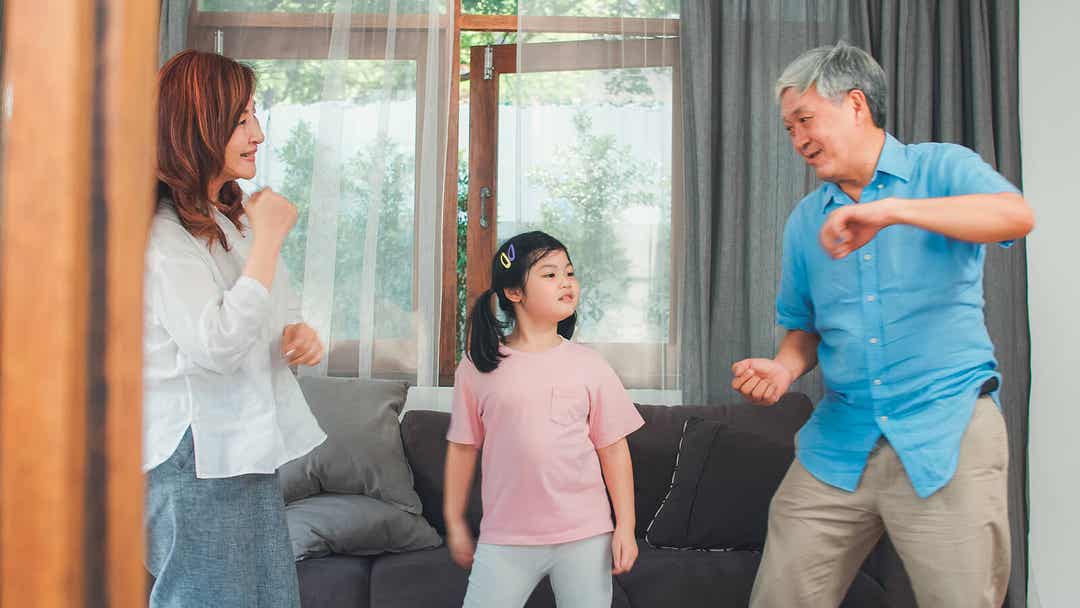A Child's Holistic Development in the Early Years

Holistic development is the key to learning in the early years of childhood. And as the primary educators of their children, parents can start them on an early learning path to success. Therefore, they need to know what a child’s holistic development looks like during the early years in order to foster their development appropriately.
How to promote holistic development in the early years?
Holistic development takes into account the whole child and their environment. When aware of this philosophy, parents and educators may find it easy to adopt the holistic approach to their children’s education.
Therefore, starting in the early years, the holistic approach to education is about a balance between the home, the environment, and the growing child.

The key areas of development
The following are the five key elements or areas of development that are the main focal points of holistic development:
- Personal and physical growth: All about the child and how they’re growing and learning.
- Social skills: How the child interacts with others and communicates in their world.
- Emotional understanding: How little ones learn to deal with hardship and adversity.
- Intellectual, cognitive, creative development, and acquisition of learning skills.
- Environmental values: Children appreciate and care for the world they live in.
How can you support your child’s holistic development?
The following tips will help you create a holistic approach to raising your child. The early years are vital and lay the foundation for an integrated, healthy, and happy lifestyle. In this regard, it is very important for parents to know how to act.
Personal and physical growth
- Understand the physical milestones your child will experience.
- Have a thorough understanding of how motor skills are based on different aspects of movement depending on the age or stage of development your child has reached.
- Engage in gross motor activities or large movements and help your child explore ways to climb, jump, balance, and run.
- Take time to experience fine motor skills or small actions, such as holding a pencil, playing with play dough, playing with sand, etc.
Social and Emotional Skills in Holistic Development
- Develop social skills by connecting your child with other children and adults.
- Practice actions such as sharing, waiting for turns, enjoying a meal together, or going on an outing.
- Apply emotional understanding
- Build awareness of others through books and stories.
- Teach empathy at home and in the community.
- Share experiences and talk about the outcomes of circumstances.
- Be aware of your child’s emotional needs.
Intellectual Development
The development of children’s cognitive skills comes with exposure to play. Playing in order to learn is a very real concept to focus on in the early years. Children are constantly learning at home during free play; they learn to imitate and make judgments as they engage in different games.
Active participation is by far the best form of education. Reading to your child adds to the dynamics of cognitive development, creates an interest in many different topics, and builds vocabulary.
Environmental values in holistic development
- In the early years, as the child becomes more aware of their background, parents can contribute to their little one’s development in this area.
- The child’s environment begins in the comfort of their home and then branches out into the real world.
- There are so many different aspects of the environment that lend themselves to connecting the child to the world in which they live.
Creating an environment for holistic development
Aspects of holistic education aren’t developed individually. When creating a realistic holistic environment, it’s important to include many of the individual aspects in the activities you plan. So, being aware of the components of holistic development makes it easier for parents to implement the overall benefits of this concept.

Holistic activity planning
When you plan activities with holistic education in mind, you’ll include the five basic principles behind the holistic education of children. This may seem challenging at first, but, in reality, many activities naturally include these principles.
For example, think of a family picnic. This outing isn’t just about having a picnic outdoors. Rather, a family picnic is full of opportunities to include social and emotional development as you organize and assist in its preparation.
First of all, the games at the picnic add to intellectual and gross motor development. At the same time, it provides a day of family interaction, which is a great social-emotional activity. What’s more, there’s time to connect with the outdoors and show respect for the environment by not littering. Therefore, as you can see, this activity meets all the requirements for organizing a holistic educational experience.
Activities that aren’t holistic
On the other hand, restrictive or sedentary activities don’t allow for holistic development. Generally speaking, children should have the freedom to actively participate in their environment. Only then can they develop their fine and gross motor skills, which are a necessity.
So, holistic educators, or parents, are aware of the need for individuals to develop cognitively, socially, and emotionally. Therefore, activities that aren’t interactive tend to deviate from the holistic approach to early childhood development.
Holistic development is the key to learning in the early years of childhood. And as the primary educators of their children, parents can start them on an early learning path to success. Therefore, they need to know what a child’s holistic development looks like during the early years in order to foster their development appropriately.
How to promote holistic development in the early years?
Holistic development takes into account the whole child and their environment. When aware of this philosophy, parents and educators may find it easy to adopt the holistic approach to their children’s education.
Therefore, starting in the early years, the holistic approach to education is about a balance between the home, the environment, and the growing child.

The key areas of development
The following are the five key elements or areas of development that are the main focal points of holistic development:
- Personal and physical growth: All about the child and how they’re growing and learning.
- Social skills: How the child interacts with others and communicates in their world.
- Emotional understanding: How little ones learn to deal with hardship and adversity.
- Intellectual, cognitive, creative development, and acquisition of learning skills.
- Environmental values: Children appreciate and care for the world they live in.
How can you support your child’s holistic development?
The following tips will help you create a holistic approach to raising your child. The early years are vital and lay the foundation for an integrated, healthy, and happy lifestyle. In this regard, it is very important for parents to know how to act.
Personal and physical growth
- Understand the physical milestones your child will experience.
- Have a thorough understanding of how motor skills are based on different aspects of movement depending on the age or stage of development your child has reached.
- Engage in gross motor activities or large movements and help your child explore ways to climb, jump, balance, and run.
- Take time to experience fine motor skills or small actions, such as holding a pencil, playing with play dough, playing with sand, etc.
Social and Emotional Skills in Holistic Development
- Develop social skills by connecting your child with other children and adults.
- Practice actions such as sharing, waiting for turns, enjoying a meal together, or going on an outing.
- Apply emotional understanding
- Build awareness of others through books and stories.
- Teach empathy at home and in the community.
- Share experiences and talk about the outcomes of circumstances.
- Be aware of your child’s emotional needs.
Intellectual Development
The development of children’s cognitive skills comes with exposure to play. Playing in order to learn is a very real concept to focus on in the early years. Children are constantly learning at home during free play; they learn to imitate and make judgments as they engage in different games.
Active participation is by far the best form of education. Reading to your child adds to the dynamics of cognitive development, creates an interest in many different topics, and builds vocabulary.
Environmental values in holistic development
- In the early years, as the child becomes more aware of their background, parents can contribute to their little one’s development in this area.
- The child’s environment begins in the comfort of their home and then branches out into the real world.
- There are so many different aspects of the environment that lend themselves to connecting the child to the world in which they live.
Creating an environment for holistic development
Aspects of holistic education aren’t developed individually. When creating a realistic holistic environment, it’s important to include many of the individual aspects in the activities you plan. So, being aware of the components of holistic development makes it easier for parents to implement the overall benefits of this concept.

Holistic activity planning
When you plan activities with holistic education in mind, you’ll include the five basic principles behind the holistic education of children. This may seem challenging at first, but, in reality, many activities naturally include these principles.
For example, think of a family picnic. This outing isn’t just about having a picnic outdoors. Rather, a family picnic is full of opportunities to include social and emotional development as you organize and assist in its preparation.
First of all, the games at the picnic add to intellectual and gross motor development. At the same time, it provides a day of family interaction, which is a great social-emotional activity. What’s more, there’s time to connect with the outdoors and show respect for the environment by not littering. Therefore, as you can see, this activity meets all the requirements for organizing a holistic educational experience.
Activities that aren’t holistic
On the other hand, restrictive or sedentary activities don’t allow for holistic development. Generally speaking, children should have the freedom to actively participate in their environment. Only then can they develop their fine and gross motor skills, which are a necessity.
So, holistic educators, or parents, are aware of the need for individuals to develop cognitively, socially, and emotionally. Therefore, activities that aren’t interactive tend to deviate from the holistic approach to early childhood development.
All cited sources were thoroughly reviewed by our team to ensure their quality, reliability, currency, and validity. The bibliography of this article was considered reliable and of academic or scientific accuracy.
- Bilbao, A. (2015) El cerebro del niño explicado a los padres. Editorial: Plataforma Actual.
This text is provided for informational purposes only and does not replace consultation with a professional. If in doubt, consult your specialist.








